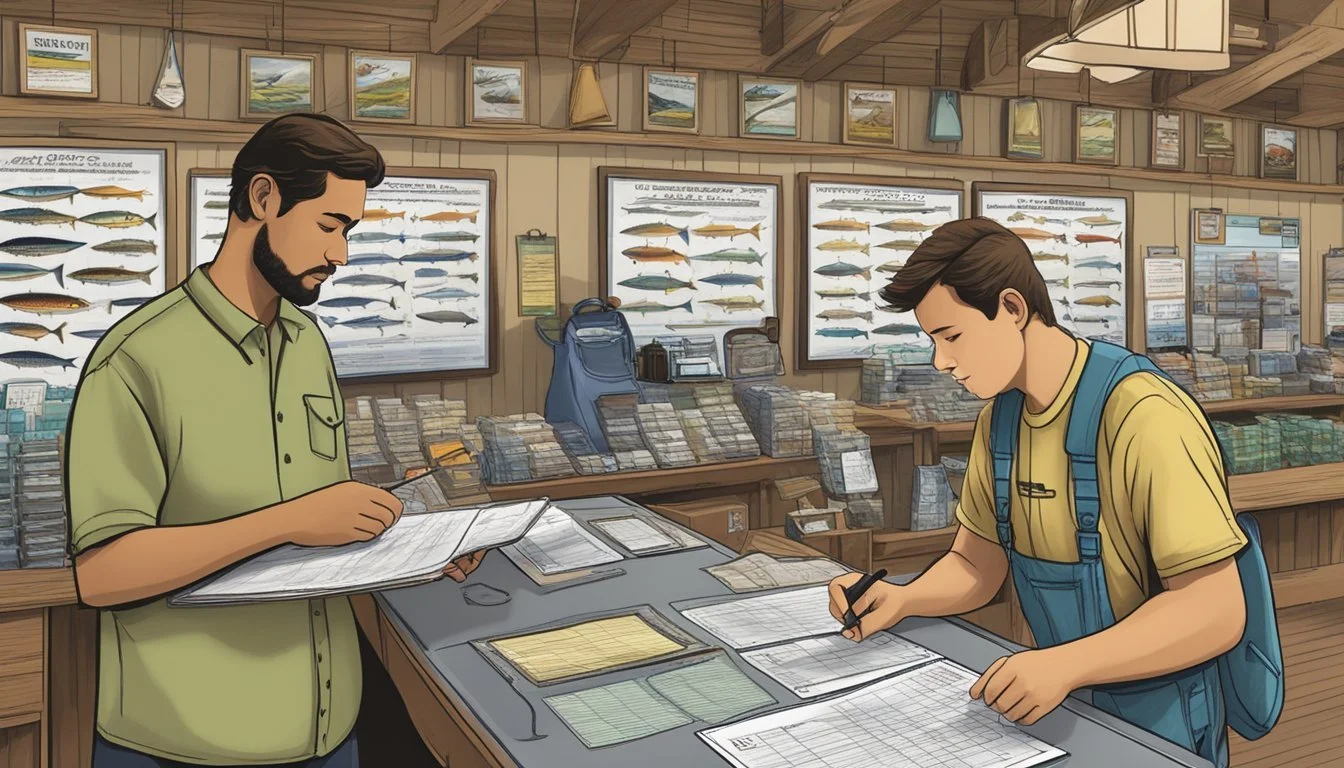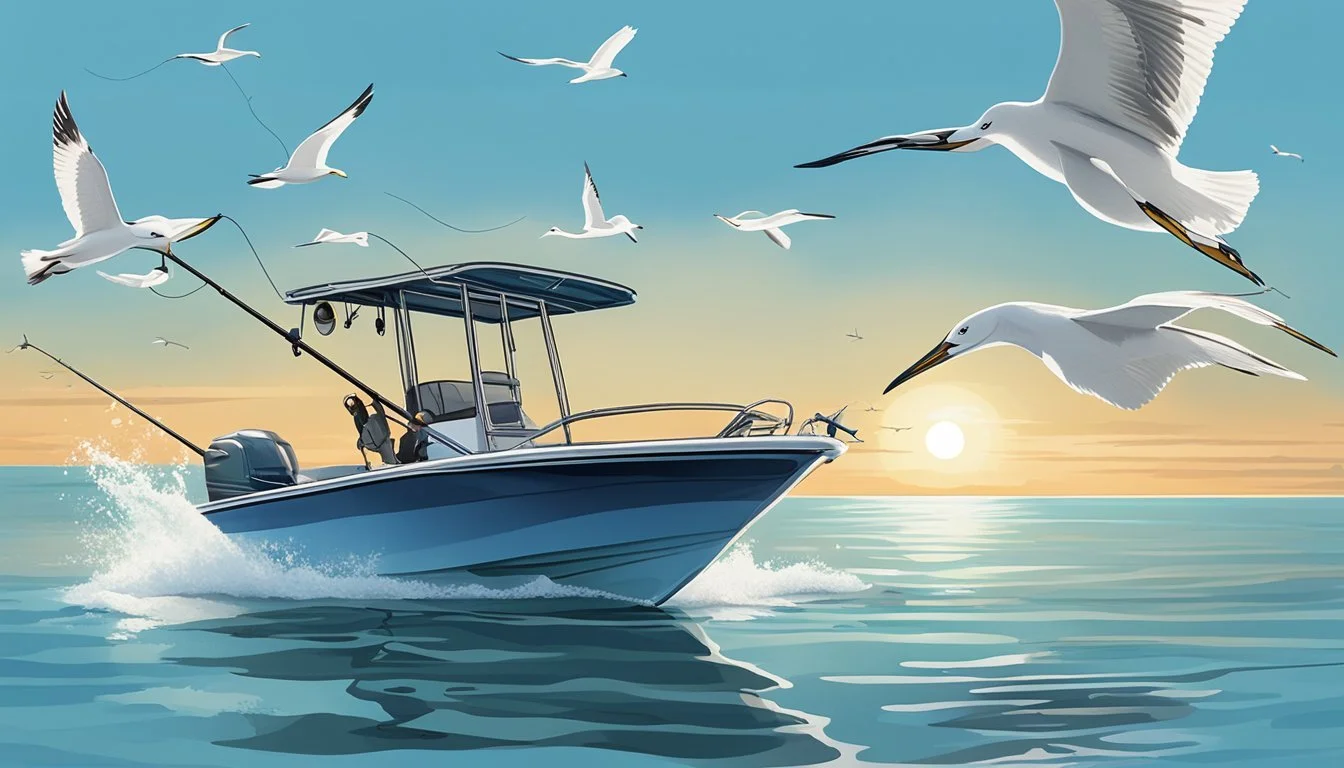How to Get a Louisiana Saltwater Fishing License
Your Quick Guide
Louisiana's abundant coastlines and waterways offer a haven for anglers seeking the thrills of saltwater fishing. From speckled trout to redfish, the state's diverse marine life ensures a memorable experience with each cast. To legally enjoy saltwater fishing in Louisiana, individuals must acquire a Saltwater License, which is a regulatory step to ensure the conservation of marine resources and sustainable enjoyment for future generations. This license is necessary for anyone fishing south of the saltwater line, with the exception of those solely targeting and possessing freshwater fish (What wine goes well with fish?) in these areas.
Obtaining a Louisiana saltwater fishing license is a straightforward process, accessible to both residents and non-residents, though the cost and type of license may vary based on residency status. Comprehensive licensing options cater to different needs, ranging from short-term to annual licenses, and provide a variety of specialized permits based on fishing practices and targeted species. It's essential to be aware that in addition to state regulations, federal laws may apply when fishing for certain species, such as reef fish, and anglers must comply with the more restrictive set of regulations to ensure legal fishing activities.
The Louisiana Department of Wildlife and Fisheries (LDWF) is the primary source for acquiring a fishing license, offering easy purchase options online, by phone, or at authorized local vendors. LDWF also provides resources on best fishing practices, size and creel limits, and other pertinent fishing regulations. Potential licensees can find all the information needed to embark on their saltwater fishing pursuits in accordance with Louisiana's fishing laws and guidelines.
Eligibility and Requirements
To fish in the saltwaters of Louisiana, anglers must possess the appropriate licenses, which vary based on residency status, type of angling, and specific regulations. Here's a clear breakdown to ensure compliance.
Determining Resident Status
In Louisiana, a resident is defined as someone who has lived in the state for at least 6 consecutive months. This distinction is important because it affects both the cost and type of fishing license an individual needs to purchase. Special considerations are also given to active-duty military personnel, veterans, and full-time students attending a Louisiana institution, as they are eligible for resident licenses.
Identifying Angler Types
Anglers are either residents or non-residents and may include seniors (60 years and older) who often qualify for discounted licensing. A Basic Fishing License is required for all anglers 18 years or older to take or possess fish in Louisiana waters, including saltwater species.
Resident Anglers: Need a Basic Fishing License and a Saltwater License.
Non-Resident Anglers: Require a non-resident version of the required licenses.
Seniors: May be eligible for discounted licensing.
Understanding Basic Regulations
To comply with state regulations, anglers fishing south of the saltwater line must hold a Saltwater License unless targeting and possessing only freshwater fish. Moreover, if saltwater fishing gear or bowfishing is involved, different permits and licenses are applicable.
Saltwater Fishing License: Mandatory for targeting saltwater species.
Bowfishing Permit: Required for any angling using bowfishing gear in saltwater areas.
Special Permits: Specialized permits such as the Atlantic HMS Charter/Headboat Permit might be necessary for federal waters fishing, depending on the target species.
In sum, obtaining the correct fishing license in Louisiana hinges on an individual's residency status, angler classification, and an understanding of the state's fishing regulations.
Types of Saltwater Licenses
Louisiana offers several types of saltwater fishing licenses to cater to the needs of various anglers, from the casual fisherman to the dedicated sports enthusiast. Each license type grants the holder specific rights and privileges to enjoy the abundant marine resources of the state.
Recreational Saltwater Licenses
For recreational fishers, Louisiana provides a Basic Saltwater Fishing License that is required for anyone who fishes in the saltwaters of Louisiana. This includes catching species such as spotted seatrout, redfish, and cobia. A Recreational Offshore Landing Permit (ROLP) is also necessary and free of charge when possessing tunas (What wine goes well with tuna?), billfish, swordfish, amberjacks, groupers, and other specified species, except for those on a chartered voyage where the captain holds a valid Charter Recreational Offshore Landing Permit.
Basic Saltwater License: Mandatory for anglers fishing in saltwater areas.
Recreational Offshore Landing Permit (ROLP): Required for specific highly migratory species.
Lifetime Licenses and Permits
Lifetime licenses are an excellent choice for avid anglers who see fishing as a long-term activity. The state of Louisiana offers Lifetime Fishing Licenses, which include both freshwater and saltwater fishing privileges, available to residents at varying prices based on age groups. These licenses eliminate the need for annual renewal and are a cost-effective solution for serious fishers.
Lifetime Saltwater Fishing License: Available for residents, catering to different age groups.
Special Licenses for Highly Migratory Species
Anglers targeting highly migratory species such as tunas, swordfish, and billfish need to be aware of federal regulations requiring additional permits. These species require specific handling and reporting due to their migratory nature and conservation status. Specific permits allow the Department to manage and protect these resources effectively. Fishers should obtain these permits before engaging in fishing activities that target these species.
Highly Migratory Species Permit: Necessary for anglers targeting tuna, billfish, and swordfish.
Purchasing the License
Purchasing a Louisiana saltwater fishing license is straightforward, with multiple methods available to suit the buyer's convenience. Whether done online, in-person, or via mail and email, the process is designed to be efficient and accessible.
Online Purchase
The quickest method to purchase a recreational fishing license is online through the official Louisiana Department of Wildlife and Fisheries (LDWF) website. The buyer can complete the transaction securely and will receive a digital copy of the license immediately.
Buying In-Person
For those who prefer a face-to-face transaction, licenses can be bought in-person. Visit the LDWF Headquarters located at 2000 Quail (What wine goes well with quail?) Drive in Baton Rouge. The office is open Monday through Friday, from 8 am to 4 pm.
Mail and Email Applications
Alternatively, applications for a recreational fishing license can be submitted by mail or email. Download the application from the LDWF website, and send the completed form to the provided email address or mailing address. Ensure all required documentation is included for a valid application.
Fishing Regulations
Louisiana's coastline provides abundant saltwater fishing opportunities that are regulated to ensure sustainable utilization of marine resources. These regulations encompass size and bag limits, restricted areas and seasons, as well as the permitted gear and methods for capturing aquatic life.
Size and Bag Limits
Under Louisiana regulations, both size limits and bag limits are strictly enforced to maintain fish populations. These limits vary by species and are updated regularly to reflect changes in fishery stock levels. For instance:
Red Drum (Redfish): Minimum size limit of 16 inches; bag limit of 5 per day.
Spotted Seatrout: Minimum size limit of 12 inches; bag limit of 25 per day.
Anglers are responsible for keeping up-to-date with the current size and bag limits before heading out to fish.
Protected Areas and Seasons
Certain areas may be closed to fishing or have seasonal restrictions to protect specific fish species during critical periods of their life cycles. For instance, during the spawning season, certain areas may be off-limits to ensure the protection of the species’ reproductive success. It is essential for anglers to check the Louisiana Department of Wildlife and Fisheries for the latest information on protected areas and seasons to comply with these conservation measures.
Special Gear and Methods
Various gear and methods are regulated to minimize the impact on marine ecosystems. In Louisiana saltwater fishing, some of the regulations include:
Trawl: Use is subject to certain areas and times, and often to the number of nets.
Bowfishing Permit: Required for those who wish to engage in bowfishing.
Dip Nets and Landing Nets: Allowed for specific purposes and may have restrictions on dimensions.
Hook and Line: Licensed anglers may use a pole or hook and line without a reel. The use of artificial bait involves additional regulations.
Each angler must possess a valid fishing license appropriate to their age and residency status, along with any additional permits required for specific gear or fishing methods.
Areas and Water Types
Louisiana offers a diverse range of fishing environments, from its rich coastal estuaries to vast inland waters. Each area comes with specific regulations and opportunities for anglers.
Coastal and Inland Waters
Coastal Areas: These encompass the regions extending from the coastline into the open Gulf of Mexico. Louisiana's coastal waters are teeming with life, making them prime spots for saltwater fishing. They are demarcated from inland waters by the "saltwater line," which is defined by the Louisiana Department of Wildlife and Fisheries (LDWF).
Inland Waters: Consist of freshwater bodies like rivers, lakes, and reservoirs away from the salty influence of the sea. Notable fishing destinations within these waters include Caddo Lake, Sabine Lake, and the Toledo Bend Reservoir on the Texas border, where anglers target a variety of freshwater species.
Border Waters and Reciprocal Agreements
Border Waters: Sabine Lake and portions of the Toledo Bend Reservoir and Caddo Lake straddle the Louisiana-Texas border. These waters are subject to both states' fishing regulations.
Reciprocal Agreements: Louisiana has agreements with Texas, allowing anglers to fish border waters with a valid license from their state of residence. However, they must adhere to the regulations of the state in which they are fishing.
Offshore Fishing Grounds
Gulf of Mexico: When fishing beyond the coastal areas, anglers venture into federal waters of the Gulf of Mexico, where state and federal regulations apply. The Gulf's offshore waters are known for their bounty, including species such as tuna and swordfish. Fishermen in these deeper waters are responsible for following both Louisiana state and federal fishing laws.
Additional Permits and Endorsements
In addition to a basic saltwater fishing license in Louisiana, anglers and charter passengers may need extra permits or endorsements, depending on their activities and gear used. Here's an overview of specific additional licenses necessary for bowfishing and charter operations.
Bowfishing and Charter Endorsements
Individuals engaging in bowfishing in Louisiana waters must obtain the proper endorsements. Recreational anglers who use bowfishing gear require a Bowfishing Permit. This is mandatory regardless of whether an angler is exempt from a basic fishing license due to age. Furthermore, charter captains who offer bowfishing experiences must hold a Charter Bowfishing Permit. Age verification is required during the permit registration process.
Charter operations necessitate a Charter Boat Fishing Guide License, specifically for those guiding in saltwater. The license is essential for both resident and nonresident charter captains. All captains are responsible for ensuring that their vessel carries the correct licensing for the targeted fishery.
Out-of-State and Reciprocity
Louisiana recognizes the importance of anglers from neighboring states and has established reciprocal agreements, particularly with Texas. This means that a Texas resident possessing a valid recreational fishing license from Texas can fish in Louisiana saltwater areas bordering Texas without a Louisiana license. However, it's crucial for out-of-state anglers to be aware that additional Louisiana-specific permits might be necessary for certain kinds of fishing activities and gear. All anglers should verify what endorsements or additional licenses are required before their fishing excursion in Louisiana waters.
Maintaining Validity and Compliance
For an angler to enjoy saltwater fishing in Louisiana without legal interruptions, they must ensure their fishing licenses are current and they uphold all state fishing regulations.
Renewal and Expiration Dates
Louisiana saltwater fishing licenses are required to be renewed annually. License validity typically aligns with the state's fiscal year, starting on June 1st and expiring on June 30th of the following year. Bona fide residency requirements must also be met; a current Louisiana ID card or driver's license serves as proof of residency.
Renewal process:
Online via the Louisiana Department of Wildlife and Fisheries website.
In-person at authorized local vendors.
By phone through the department's contact center.
Expiration:
Licenses expire at midnight on June 30 each year.
Anglers must renew their license earlier if they plan to fish on or after July 1.
It is paramount for fishermen to be attentive to these dates to avert penalties and continue lawful fishing activities in Louisiana's public waters.
Compliance with Local Laws
Anglers must comply with specific regulations according to the areas they fish in and the gear they use. In some cases, additional permits like a fishing gear permit are mandatory, such as for those targeting specific species with bowfishing equipment or using handlines for tunas, sharks, and swordfish.
Laws and permits to consider:
Saltwater fishing beyond the designated saltwater line requires a Saltwater License.
A Basic Fishing License is needed for catching freshwater species in saltwater areas.
Additional permits for bowfishing and Atlantic highly migratory species might be required.
Anglers are advised to regularly check for updates on regulations to avoid non-compliance, as Louisiana's Department of Wildlife and Fisheries may enact emergency closures or rule changes that could affect fishing activities.
Tips for a Successful Saltwater Fishing Trip
Before heading out on a Louisiana saltwater fishing trip, it is essential to prepare with the appropriate gear and consider hiring a local guide for valuable insights. This preparation can make the difference between an ordinary outing and an extraordinary fishing experience.
Selecting the Right Gear
When packing for a saltwater fishing expedition, it's crucial to equip oneself with the right gear to target species like snappers, groupers, cobia, wahoo, dolphinfish, and sharks.
Rods and Reels: Choose a heavy-duty rod and reel combo to withstand the fight from larger saltwater species.
Line: Utilize a braided line for its strength and durability in a saltwater environment.
Hooks: Stock an assortment of hooks in various sizes to suit different types of fish, from speckled trout to larger predators.
Bait: Live bait such as shrimp or mullet tend to attract a wide range of saltwater fish. For artificial lures, opt for colors and designs that mimic the local baitfish.
Hiring a Guide for Local Insights
Securing the services of a local guide can be invaluable, especially for recreational fishers who are not familiar with the area.
Local Knowledge: Guides possess in-depth knowledge about local species’ habits and hotspots, which can enhance the fishing experience.
Techniques: They can teach proper saltwater fishing techniques that are effective for catching Louisiana's diverse marine life.
Regulations: A guide ensures that fishers comply with local fishing regulations, including size and bag limits, to promote sustainable practices.
By investing in quality gear and enlisting the help of a seasoned guide, anglers can significantly increase their chances of a successful and memorable saltwater fishing trip in Louisiana.
Conservation and Ethical Angling
In Louisiana, balancing the enjoyment of saltwater fishing with the health of marine ecosystems is paramount. Anglers are encouraged to understand conservation measures and practice catch and release to ensure the longevity of species like the spotted seatrout, red snapper, and gray triggerfish.
Understanding Conservation Measures
Recreational Fishing Licenses: All anglers above the age of 18 must obtain a Recreational Offshore Landing Permit, along with the relevant fishing licenses, to catch certain species in Louisiana waters. This is a legislative measure aiming to monitor and control fishing activities to help maintain fish populations.
Spotted Seatrout & Red Snapper: These species are subject to specific conservation measures, including size and bag limits, to prevent overfishing.
Crabbing: The use of up to 10 crab (What wine goes well with crab?) traps is permissible with the appropriate saltwater fishing license, which includes gear regulations designed to reduce the impact on crab populations.
Catch and Release Best Practices
When practicing catch and release, anglers should:
Handle with Care: Use wet hands or gloves to handle fish, support their weight horizontally, and avoid touching their gills.
Use Proper Equipment:
Barbless hooks or circle hooks to minimize injury.
Appropriate nets to prevent damage to the fish.
Quick Release: Return the fish to the water as soon as possible to reduce stress and increase survival rates.
Gray Triggerfish, notably, may require particular methods of release due to their susceptibility to barotrauma when caught in deep water. Anglers should familiarize themselves with and utilize venting tools or release devices to aid in the safe return of these fish to their habitat.







